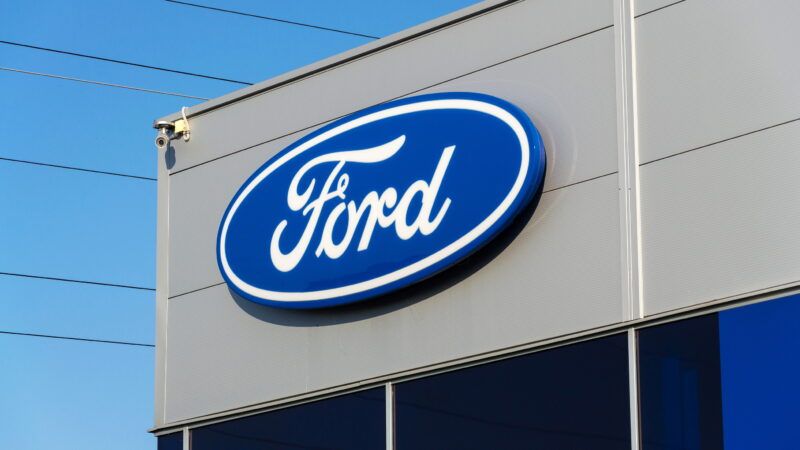Ford's E.V. Charger Mandate Shows How Broken Dealership Laws Are
The current franchise dealership model does not benefit consumers. It also may not benefit dealerships.

Ford Motor Co. is openly chasing after Tesla, which manufactures 70 percent of all electric vehicles (E.V.) sold in the U.S. Earlier this year, Ford announced it would be restructuring its business, equally investing in both E.V. and internal combustion production, putting $50 billion into E.V.s by 2026 and considering options like online ordering and "transparent non-negotiable prices" with no unnecessary extras and no need to haggle. Tesla currently offers versions of these options.
Last week, InsideEVs reported that Ford is imposing new rules on its more than 3,000 franchise dealerships. If any dealer wishes to continue selling Ford electrics, it must pursue one of two levels of E.V. certification. The lower tier, Model E Certified, requires a dealership to install a direct current (D.C.) fast-charging station for public use. D.C. chargers, also called Level 3 chargers, can fully charge an electric car from empty in minutes, as opposed to Level 2 chargers, which can take hours. Conversely, D.C. chargers are extremely expensive and use direct current electricity rather than alternating current that comes from the electrical grid.
Ford estimates that becoming Model E Certified will cost about $500,000, nearly all of which will come from installing chargers. But even then, there would be an annual cap on how many E.V.s a dealership can sell. To avoid the limitation, a dealership must be Model E Certified Elite, which requires installing two additional D.C. chargers, plus a Level 2 charger. Becoming fully certified will cost a dealership between $1 million and $1.2 million.
If a dealership does none of the above and installs no chargers, it must discontinue selling Ford E.V.s by 2024. It can change its mind later but must opt out for at least three years. All dealerships must decide by the end of next month which choice to make.
The choice that Ford is foisting upon its franchisees is difficult. In 2020, the average dealership earned just over $2 million in profit, a sharp increase over the previous year. Now, Ford is asking its dealers to spend 25–60 percent of that total to take part in a fast-growing segment of the automotive market.
Ironically, the difficult situation is the result of cronyist dealer franchise laws that car dealers initially fought for.
Beginning in the 1930s, dealers pressured states to adopt laws regulating automotive sales. The terms vary, but most states forbid auto manufacturers from selling cars directly to consumers without going through a franchised dealer. This means that unlike nearly every other consumer good, potential motorists can't go on a manufacturer's website and customize a car to be delivered to them directly; a dealership still has to act as a middleman.
Now, as Ford Motor Co. tries desperately to catch up to Tesla's E.V. sales, Ford dealerships are on the hook for costly upgrades despite the fact that they are not even playing by the same set of rules.
Tesla switched to all-online sales in 2019. The move required lobbying state lawmakers directly for carve-outs that would allow the company to circumvent dealer franchise laws. For example, Nevada passed Assembly Bill 2 in 2014, which allowed Tesla to sell cars in the state without franchise dealerships. (Meanwhile, Texas, the automaker's new home, forbids direct sales. Texans must pick up their cars from one of the state's eight Tesla service centers.)
Of course, lobbying states for carve-outs is not an ideal system either. The best option would be for states to simply scrap the franchise laws and let the market decide the best ways for consumers to buy their cars.
A 2015 paper from the Mercatus Center at George Mason University argued that a built-to-order direct-to-consumer system with no unnecessary middlemen could save purchasers over $2,000 per car. In a direct-to-consumer system, dealerships could still exist; any shoppers who wish to take a test drive or get service work done at a brand-licensed location would be free to do so. But consumers would also have more freedom over their purchases—both what they can buy and how they can buy it. (Interestingly, Ford CEO Jim Farley estimates that Tesla currently has a $2,000 price advantage per vehicle, so scrapping the dealership system could also help Ford stay competitive.)
The auto dealer franchise model hasn't benefited consumers for some time, and with Ford's new move, it may not even benefit dealerships anymore. States should set motorists free to make their own purchasing decisions, however they see fit.


Show Comments (95)